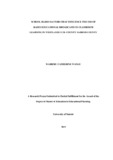| dc.contributor.author | Wairimu, Catherine Wangu | |
| dc.date.accessioned | 2015-09-15T09:16:09Z | |
| dc.date.available | 2015-09-15T09:16:09Z | |
| dc.date.issued | 2015 | |
| dc.identifier.uri | http://hdl.handle.net/11295/91048 | |
| dc.description | Master of Education in Educational Planning | en_US |
| dc.description.abstract | The radio has been used in many countries all over the world as an
instructional media. In Kenya, the Ministry of Education Science and
Technology through the Kenya Institute of Curriculum Development has
worked very hard to develop radio educational broadcasts to be used as
instructional media in Kenyan schools. This research study sought to
establish the school based factors that influence the use of Radio Educational
Broadcasts in the Primary Schools in Westlands Sub-county, Nairobi County.
This study had the following objectives: to determine teachers usage of radio
educational broadcasts in the teaching/learning process in the classroom in
the primary schools of Westlands sub-county ; to determine the availability of
broadcast support materials for teachers‟ use during broadcast to primary
schools in Westlands Sub County: to ascertain the extent to which teachers in
the primary schools in Westlands have enough information and skills on the
use of radio educational broadcasts in classroom teaching, to assess the radio
drawbacks that influence the use of radio in teaching and learning in the
primary schools of Westlands Sub-county. The use of questionnaires was
employed where eight (8) schools were sampled from the twenty five (25)
primary schools in Westlands sub county Nairobi County. Qualitative and
quantitative research was used. Data was analyzed by descriptive statistics
facilitated by the use of SPSS. The study established that the primary schools
of Westlands have access to the radio broadcasts though not widely used.
Most schools did not use the radio broadcasts in the classroom any more.
Most pupils claimed that they had not listened to radio broadcasts while
others had listened once. They did not therefore know how to operate the
radio receivers. Most schools did not have support materials but had few
radio receivers. Teachers did not have enough knowledge and skills on the
use of educational broadcasts. KICD no longer organized seminars and
workshops for teachers to enlighten them on the use of radio broadcasts.
Current KICD broadcasts were not available even at the Kenya Institute of
Curriculum Development. The most recent timetable was for 2014.The
Government did not provide funds for purchase of radio transistors or for
broadcast support materials for teachers. Many radio transistors in schools
were not in good condition. The study therefore recommends that all schools
embrace radio broadcast in teaching. The Government should provide
broadcast support materials and radio receivers the same way they provide
text books and find ways for maintenance and repair to make the programme
sustainable. The ICT curriculum should be implemented in all schools and
teachers colleges to help teachers acquire appropriate knowledge and skills
on use of broadcasts. The KICD should monitor the programme closely to
find out the needs of the learners and teachers and discover ways to make the
programme more effective. They should also organize seminars and
workshops to enlighten teachers. | en_US |
| dc.language.iso | en | en_US |
| dc.publisher | University of Nairobi | en_US |
| dc.subject | Radio educational broadcasts | en_US |
| dc.title | School based factors that influence the use of radio educational broadcasts in classroom learning in Westlands Sub- County Nairobi County | en_US |
| dc.type | Thesis | en_US |
| dc.type.material | en_US | en_US |

